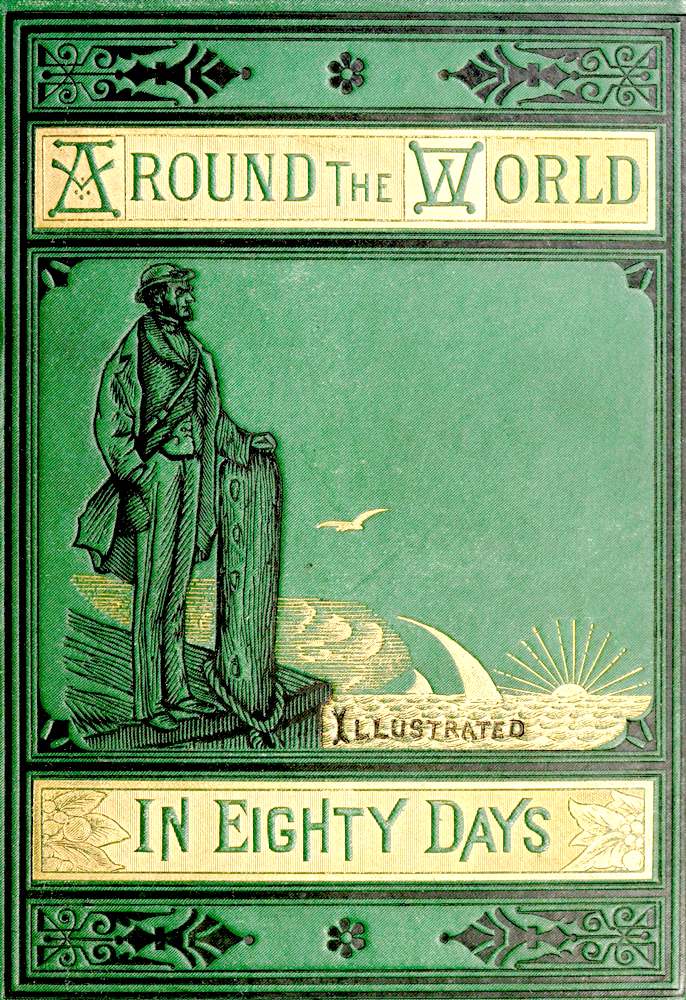|
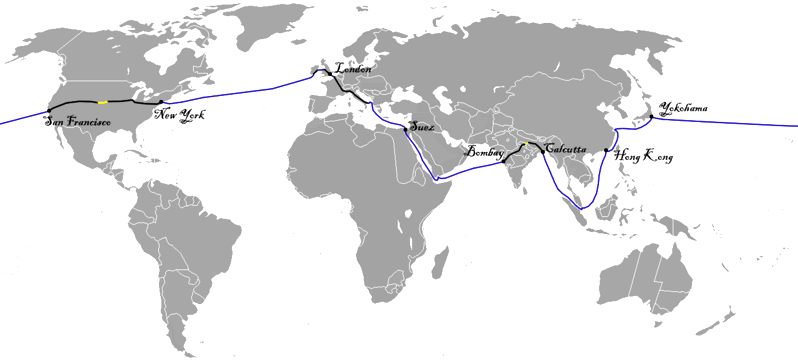
Map
of the route taken by Phileas Fogg, starting in London, then proceeding
east to Suez, Bombay, Calcutta, Hong Kong , Yokohama, San Francisco, New
York, and across the Atlantic
ocean to Ireland, then Liverpool England, and back to London. The route
planner below is for a circumnavigation on water in under 80 days, using
hydrogen, as per the author's prediction in The Mysterious Island. It
would be a major achievement if this was arranged to honor the 150th
anniversary of his publication.
<<<<
CHAPTER XXXVII.
IN WHICH IT IS SHOWN THAT PHILEAS FOGG GAINED NOTHING BY HIS TOUR AROUND THE WORLD, UNLESS IT WERE HAPPINESS
Yes; Phileas Fogg in person.
The reader will remember that at five minutes past eight in the evening—about five and twenty hours after the arrival of the travellers in London—Passepartout had been sent by his master to engage the services of the Reverend Samuel Wilson in a certain marriage ceremony, which was to take place the next day.
Passepartout went on his errand enchanted. He soon reached the clergyman’s house, but found him not at home. Passepartout waited a good twenty minutes, and when he left the reverend gentleman, it was thirty-five minutes past eight. But in what a state he was! With his hair in disorder, and without his hat, he ran along the street as never man was seen to run before, overturning passers-by, rushing over the sidewalk like a waterspout.
In three minutes he was in Saville Row again, and staggered back into Mr. Fogg’s room.
He could not speak.
“What is the matter?” asked Mr. Fogg.
“My master!” gasped Passepartout—“marriage—impossible—”
“Impossible?”
“Impossible—for to-morrow.”
“Why so?”
“Because to-morrow—is Sunday!”
“Monday,” replied Mr. Fogg.
“No—to-day is Saturday.”
“Saturday? Impossible!”
“Yes, yes, yes, yes!” cried Passepartout. “You have made a mistake of one day! We arrived twenty-four hours ahead of time; but there are only ten minutes left!”
Passepartout had seized his master by the collar, and was dragging him along with irresistible force.
Phileas Fogg, thus kidnapped, without having time to think, left his house, jumped into a cab, promised a hundred pounds to the cabman, and, having run over two dogs and overturned five carriages, reached the Reform Club.
The clock indicated a quarter before nine when he appeared in the great saloon.
Phileas Fogg had accomplished the journey round the world in eighty days!
Phileas Fogg had won his wager of twenty thousand pounds!
How was it that a man so exact and fastidious could have made this error of a day? How came he to think that he had arrived in London on Saturday, the twenty-first day of December, when it was really Friday, the twentieth, the seventy-ninth day only from his departure?
The cause of the error is very simple.
Phileas Fogg had, without suspecting it, gained one day on his journey, and this merely because he had travelled constantly eastward; he would, on the contrary, have lost a day had he gone in the opposite direction, that is, westward.
In journeying eastward he had gone towards the sun, and the days therefore diminished for him as many times four minutes as he crossed degrees in this direction. There are three hundred and sixty degrees on the circumference of the earth; and these three hundred and sixty degrees, multiplied by four minutes, gives precisely twenty-four hours—that is, the day unconsciously gained. In other words, while Phileas Fogg, going eastward, saw the sun pass the meridian eighty times, his friends in London only saw it pass the meridian seventy-nine times. This is why they awaited him at the Reform Club on Saturday, and not Sunday, as Mr. Fogg thought.
And Passepartout’s famous family watch, which had always kept London time, would have betrayed this fact, if it had marked the days as well as the hours and the minutes!
Phileas Fogg, then, had won the twenty thousand pounds; but, as he had spent nearly nineteen thousand on the way, the pecuniary gain was small. His object was, however, to be victorious, and not to win money. He divided the one thousand pounds that remained between Passepartout and the unfortunate Fix, against whom he cherished no grudge. He deducted, however, from Passepartout’s share the cost of the gas which had burned in his room for nineteen hundred and twenty hours, for the sake of regularity.
That evening, Mr. Fogg, as tranquil and phlegmatic as ever, said to Aouda: “Is our marriage still agreeable to you?”
“Mr. Fogg,” replied she, “it is for me to ask that question. You were ruined, but now you are rich again.”
“Pardon me, madam; my fortune belongs to you. If you had not suggested our marriage, my servant would not have gone to the Reverend Samuel Wilson’s, I should not have been apprised of my error, and—”
“Dear Mr. Fogg!” said the young woman.
“Dear Aouda!” replied Phileas Fogg.
It need not be said that the marriage took place forty-eight hours after, and that Passepartout, glowing and dazzling, gave the bride away. Had he not saved her, and was he not entitled to this honour?
The next day, as soon as it was light, Passepartout rapped vigorously at his master’s door. Mr. Fogg opened it, and asked, “What’s the matter, Passepartout?”
“What is it, sir? Why, I’ve just this instant found out—”
“What?”
“That we might have made the tour of the world in only seventy-eight days.”
“No doubt,” returned Mr. Fogg, “by not crossing India. But if I had not crossed India, I should not have saved Aouda; she would not have been my wife, and—”
Mr. Fogg quietly shut the door.
Phileas Fogg had won his wager, and had made his journey around the world in eighty days. To do this he had employed every means of conveyance—steamers, railways, carriages, yachts, trading-vessels, sledges, elephants. The eccentric gentleman had throughout displayed all his marvellous qualities of coolness and exactitude. But what then? What had he really gained by all this trouble? What had he brought back from this long and weary journey?
Nothing, say you? Perhaps so; nothing but a charming woman, who, strange as it may appear, made him the happiest of men!
Truly, would you not for less than that make the tour around the world?
THE
END
CHAPTERS
1. - I. IN WHICH PHILEAS FOGG AND PASSEPARTOUT ACCEPT EACH OTHER, THE ONE AS
MASTER AND AS MAN
2. - II. IN WHICH PASSEPARTOUT IS CONVINCED THAT HE HAS AT LAST FOUND HIS IDEAL
3. - III. IN WHICH A CONVERSATION TAKES PLACE WHICH SEEMS LIKELY TO COST PHILEAS FOGG DEAR
4. - IV. IN WHICH PHILEAS FOGG ASTOUNDS
PASSEPARTOUT, HIS SERVANT
5. - V. IN WHICH A NEW SPECIES OF FUNDS, UNKNOWN TO THE MONEYED MEN, APPEARS ON ’CHANGE
6. - VI. IN WHICH FIX, THE DETECTIVE, BETRAYS A VERY NATURAL IMPATIENCE
7. - VII. WHICH ONCE MORE DEMONSTRATES THE USELESSNESS OF PASSPORTS AS AIDS TO DETECTIVES
8. - VIII. IN WHICH PASSEPARTOUT TALKS RATHER MORE, PERHAPS, THAN IS PRUDENT
9. - IX. IN WHICH THE RED SEA AND THE INDIAN OCEAN PROVE PROPITIOUS TO THE DESIGNS OF PHILEAS FOGG
10. - X. IN WHICH PASSEPARTOUT IS ONLY TOO GLAD TO GET OFF WITH THE LOSS OF HIS SHOES
11. - XI. IN WHICH PHILEAS FOGG SECURES A CURIOUS MEANS OF CONVEYANCE AT A FABULOUS PRICE
12. - XII. IN WHICH PHILEAS FOGG AND HIS COMPANIONS VENTURE ACROSS THE INDIAN FORESTS, AND WHAT ENSUED
13. - XIII. IN WHICH PASSEPARTOUT RECEIVES A NEW PROOF THAT FORTUNE FAVORS THE BRAVE
14. - XIV. FOGG DESCENDS THE LENGTH OF THE BEAUTIFUL VALLEY OF THE GANGES WITHOUT EVER THINKING OF SEEING IT
15. - XV. IN WHICH THE BAG OF BANKNOTES DISGORGES SOME THOUSANDS OF POUNDS MORE
16. - XVI. IN WHICH FIX DOES NOT SEEM TO UNDERSTAND IN THE LEAST WHAT IS SAID TO HIM
17. - XVII. SHOWING WHAT HAPPENED ON THE VOYAGE FROM SINGAPORE TO HONG KONG
18. - XVIII. IN WHICH PHILEAS FOGG, PASSEPARTOUT, AND FIX GO EACH ABOUT HIS BUSINESS
19. - XIX. IN WHICH PASSEPARTOUT TAKES A TOO GREAT INTEREST IN HIS MASTER, AND WHAT COMES OF IT
20. - XX. IN WHICH FIX COMES FACE TO FACE WITH PHILEAS FOGG
21. - XXI. IN WHICH THE MASTER OF THE “TANKADERE” RUNS GREAT RISK OF LOSING A REWARD OF TWO HUNDRED POUNDS
22. - XXII. PASSEPARTOUT DISCOVERS IT IS CONVENIENT TO HAVE MONEY IN ONE’S POCKET
AT THE ANTIPODES
23. - XXIII. IN WHICH PASSEPARTOUT’S NOSE BECOMES OUTRAGEOUSLY LONG
24. - XXIV. DURING WHICH MR. FOGG AND PARTY CROSS THE PACIFIC OCEAN
25. - XXV. IN WHICH A SLIGHT GLIMPSE IS HAD OF SAN FRANCISCO
26. - XXVI. IN WHICH PHILEAS FOGG AND PARTY TRAVEL BY THE PACIFIC RAILROAD
27. - XXVII. IN WHICH PASSEPARTOUT UNDERGOES, AT A SPEED OF 20 MPH, A COURSE OF MORMON HISTORY
28. - XXVIII. IN WHICH PASSEPARTOUT DOES NOT SUCCEED IN MAKING ANYBODY LISTEN TO REASON
29. - XXIX. IN WHICH CERTAIN INCIDENTS ARE NARRATED WHICH ARE ONLY TO BE MET WITH ON AMERICAN RAILROADS
30. - XXX. IN WHICH PHILEAS FOGG SIMPLY DOES HIS DUTY
31. - XXXI. IN WHICH FIX, THE DETECTIVE, CONSIDERABLY FURTHERS THE INTERESTS OF PHILEAS FOGG
32. - XXXII. IN WHICH PHILEAS FOGG ENGAGES IN A DIRECT STRUGGLE WITH BAD FORTUNE
33. - XXXIII. IN WHICH PHILEAS FOGG SHOWS HIMSELF EQUAL TO THE OCCASION
34. - XXXIV. IN WHICH PHILEAS FOGG AT LAST REACHES LONDON
35. - XXXV. IN WHICH PHILEAS FOGG DOES NOT HAVE TO REPEAT HIS ORDERS TO PASSEPARTOUT TWICE
36. - XXXVI. IN WHICH PHILEAS FOGG’S NAME IS ONCE MORE AT A PREMIUM ON ’CHANGE
37. - XXXVII. PHILEAS FOGG FINDS HE GAINED NOTHING BY HIS TOUR AROUND THE WORLD, UNLESS IT WERE HAPPINESS
PLOT
- AROUND
THE WORLD IN EIGHTY DAYS
The story starts in London on October 2, 1872. Phileas Fogg is a wealthy, solitary, unmarried gentleman with regular habits. The source of his wealth is not known and he lives modestly. He fires his former valet, James Forster, for bringing him shaving
water two degrees too cold. He hires as a replacement
Passepartout, a Frenchman of around 30 years of age.
Later that day in the Reform Club, he gets involved in an argument over an article in
The Daily
Telegraph, stating that with the opening of a new railway section in India, it is now possible to travel around the world in 80 days.
Fogg accepts a wager for £20,000 from his fellow club members, which he will receive if he makes it around the world in 80 days. Accompanied by his manservant
Passepartout, he leaves London by train at 8.45 p.m. on October 2, 1872, and thus is due back at the Reform Club at the same time 80 days later, on December 21.
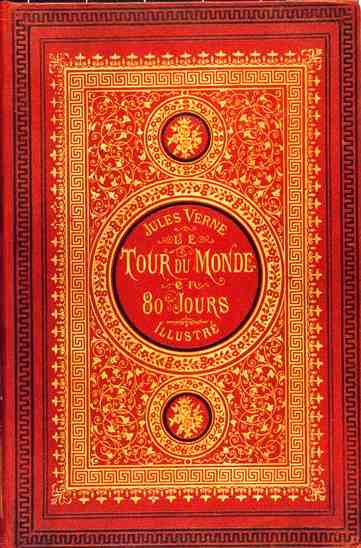
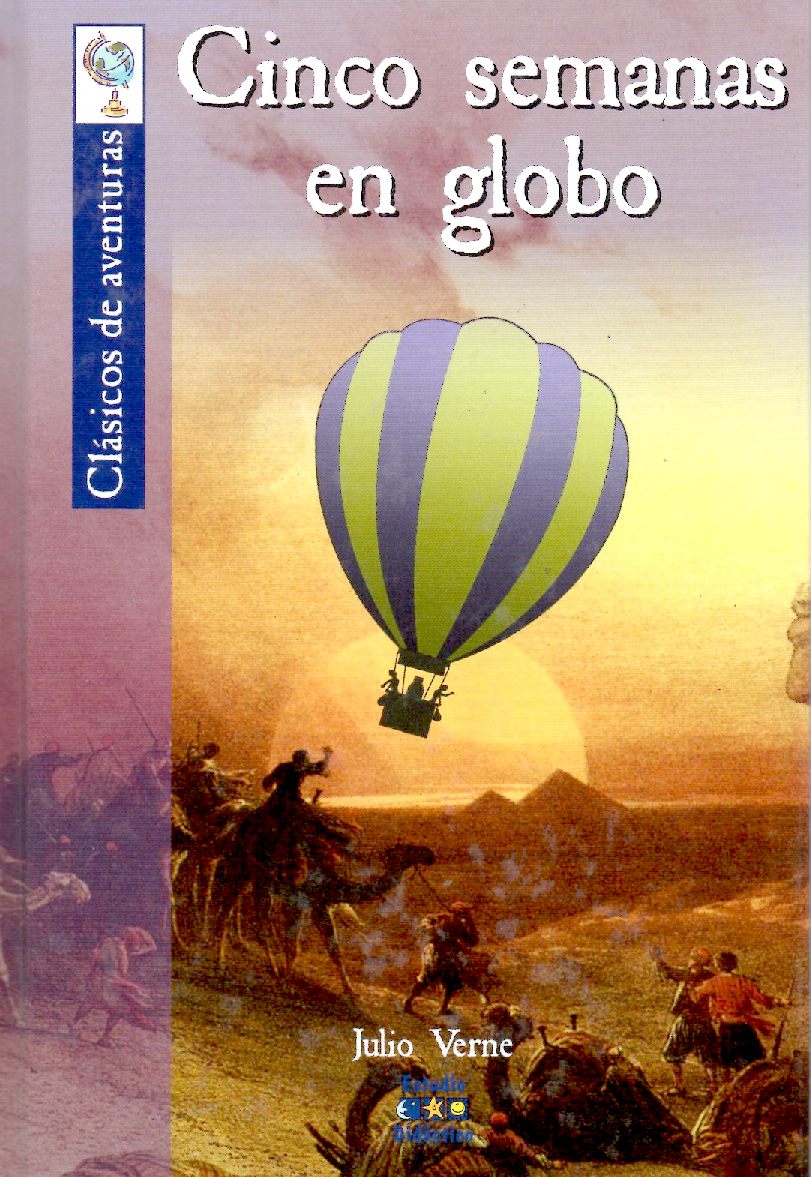
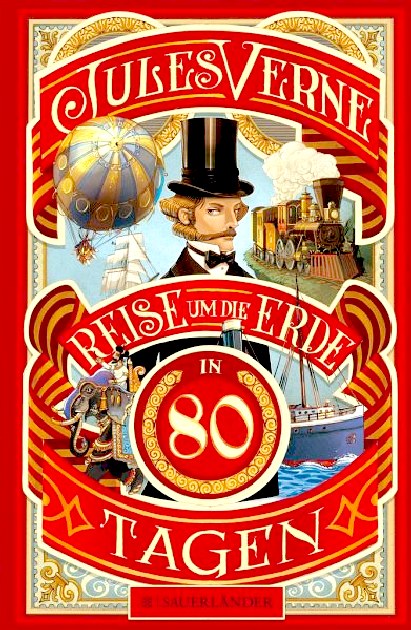
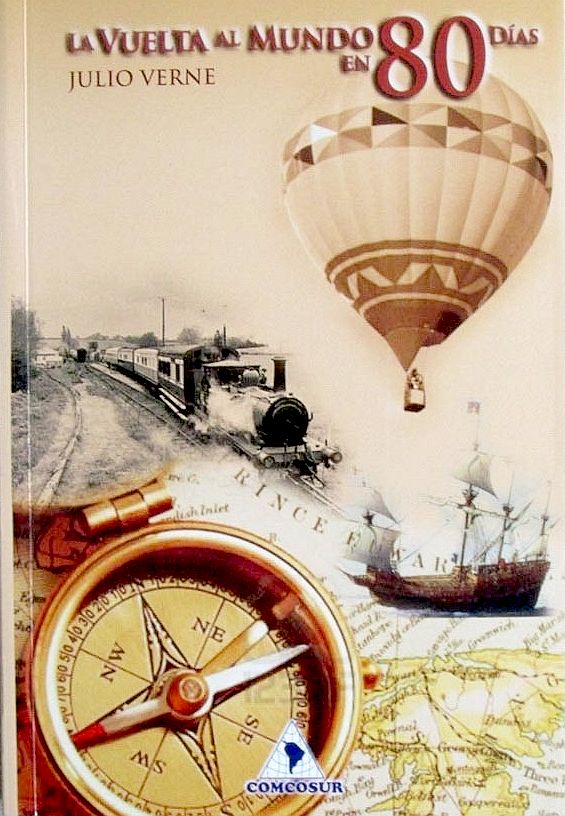
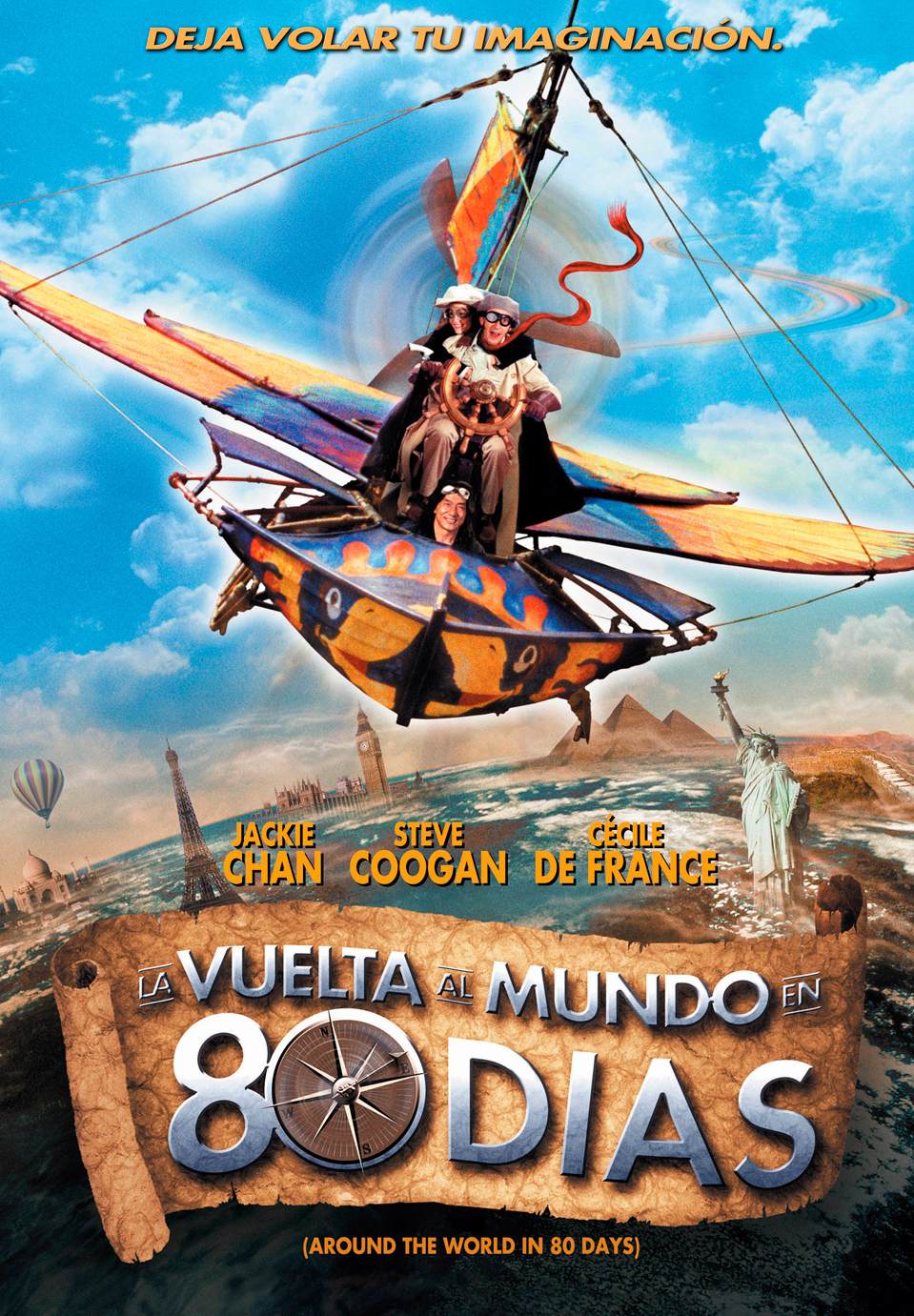
Many
of his stories today seem a little tame, as technology has caught up
with the imagination of the extraordinary French author, and Hollywood
has discovered Computer Generated Images (CGI) allowing super heroes to
grace our screens as never before. Computers are one thing that Verne
did not imagine or seek to portray.
Beginning in late 1872, the serialized version of Verne's famed Around the World in Eighty Days (Le Tour du monde en quatre-vingts jours) first appeared in print. The story of Phileas Fogg and Jean Passepartout takes readers on an adventurous global tour at a time when travel was becoming easier and alluring. In the century plus since its original debut, the work has been adapted for the theater, radio, television and film, including the classic 1956 version starring David
Niven. The TV series starring Pierce Brosnan released in 1989, runs for around 6 hours on
2 DVDs. A BBC
TV travel documentary starring Michael Palin, was also screened in
1989. A second TV series starring David Tennant was produced by the
BBC for 2021.
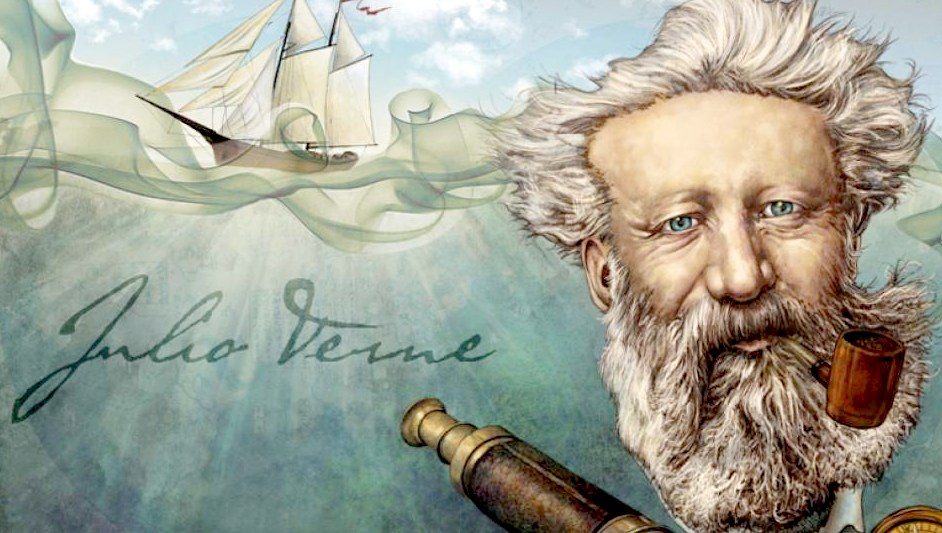
Jules
Verne is known as the Father of Science Fiction
Where
Jules Verne's suggested that it might be possible to travel
Around The
World In 80 Days, we would like to extend that ethos to include
traveling in a Zero
Emission yacht (ZEWT or ZEV) driven by electric
hydro-jets? With the advent of solar power, liquid hydrogen, methanol
reformers, and fuel
cells - we'll wager that it is a distinct possibility - on a scale of the
stake that the legendary Philleas Fogg entered into at the Reform Club in
1872. Now there's a challenge for you. Place your bets!
|







